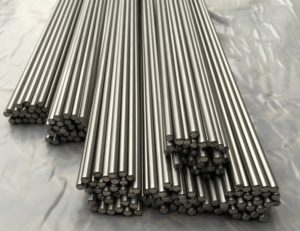1. Low density, high specific strength
Titanium has a density of 4.51g/cm3, higher than aluminium and lower than iron, copper and nickel, but the specific strength of Titanium is the highest among metals.
2. Corrosion resistance
Titanium is a very active metal. Its equilibrium potential is very low and its thermodynamic corrosion tendency in medium is high. In fact, titanium is very stable in many media, such as oxidizing, neutral and weak reducing media. This is because titanium and oxygen have a great affinity. In air or medium containing oxygen, a dense, strong adhesion and inert oxide film is formed on the surface of titanium, which protects the titanium matrix from corrosion. Even due to mechanical wear, it will soon heal or regenerate. This indicates that titanium is a metal with strong passivation tendency. Titanium oxide films at medium temperatures below 315 keep this characteristic all the time.
In order to improve the corrosion resistance of titanium, surface treatment technologies such as oxidation, electroplating, plasma spraying, ion nitriding, ion implantation and laser treatment have been developed. Titanium oxide film plays a protective role. The desired corrosion resistance was obtained. A series of corrosion-resistant titanium alloys, such as Ti-Mo, Ti-Pd, Ti-Mo-Ni, have been developed to meet the needs of metal materials in the production of sulphuric acid, hydrochloric acid, methylamine solution, high temperature wet chlorine and high temperature chloride. Titanium castings are made of Ti-32 molybdenum alloy. Ti-0.3 molybdenum-0.8 nickel alloy or Ti-0.2 palladium alloy are used locally in the environment where crevice corrosion or pitting corrosion often occurs. Good results are obtained.
3. Good heat resistance
The new titanium alloy can be used for a long time at 600 C or higher.
4. Good low temperature resistance
The strength increases with the decrease of temperature, but the plasticity does not change much. The ductility and toughness are maintained at – 196 – 253 ~C. It avoids the cold brittleness of metals and is an ideal material for cryogenic containers, tanks and other equipment.
5. Strong anti-damping performance.
Titanium metal is subject to mechanical vibration. Compared with steel and copper metal, its own vibration attenuation time is the longest. Using this property of titanium, it can be used as vibration element of tuning fork, medical ultrasonic crusher and vibration film of advanced loudspeaker.
6. Non-magnetic and non-toxic
Titanium is a non-magnetic metal, which will not be magnetized in a large magnetic field. It is non-toxic and has good compatibility with human tissues and blood, so it is adopted by the medical profession.
7. Tensile strength is close to yield strength.
This property of titanium shows that its yield strength ratio (tensile strength/yield strength) is high, which indicates that the plastic deformation of metal matrix is poor. Because the ratio of yield limit of titanium to the amount of elastic film is large, the resilience of titanium during forming is great.
8. Good heat transfer performance
Although the thermal conductivity of metallic state is lower than that of carbon steel and copper, the wall thickness of titanium can be greatly reduced due to its excellent corrosion resistance. The heat transfer between surface and steam is dropwise condensation, which reduces the thermal resistance. Non-scaling on the surface of titanium can also reduce the thermal resistance, thus greatly improving the heat transfer performance of titanium.
9. Low modulus of elasticity
The elastic modulus of titanium at room temperature is 106.4 MPa, which is 57% of that of steel.
10. Inhalation performance
Titanium is a metal with very active chemical properties. It can react with many elements and compounds at high temperature. Titanium gas absorption mainly refers to the reaction with carbon, hydrogen and oxygen at high temperature.

